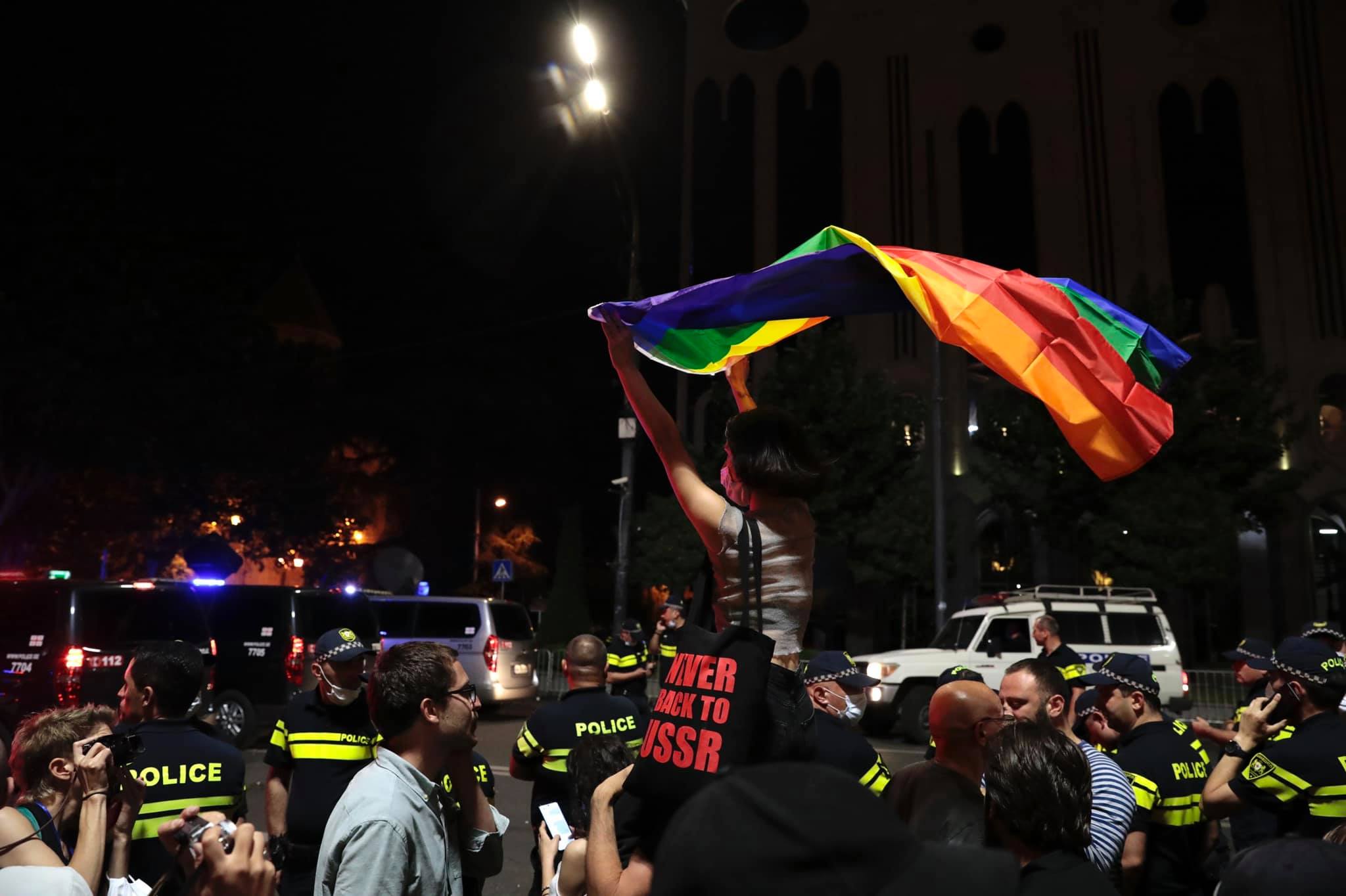Georgian Dream’s Oppressive Anti-LGBT Law Comes into Effect
Georgian Dream’s homophobic and transphobic law “On the Protection of Family Values and Minors,” adopted in September, comes into force on December 2.
The repressive law, introduced as part of Georgian Dream’s hate-laced election campaign, imposes several restrictions on freedom of expression and assembly for queer people, bans gender reassignment surgeries and legal procedures for gender recognition, reaffirms the ban on same-sex marriage, and introduces censorship in media and education.
The law bans adoption and fostering by LGBT people, equates incest with homosexuality, and, in addition to already illegal same-sex marriage, outlaws other alternative forms of civil union among non-heterosexual couples. The legislation also declares May 17 – a day of “family sanctity and respect for parents” – a public holiday. The date was chosen on purpose by the Georgian Orthodox Church to clash with International Day against Homophobia, Transphobia, and Biphobia, celebrated on the same day.
The law “mirrors the draconian measures implemented in Putin’s Russia over the past decade, laws specifically weaponized against regime critics and the LGBTQI+ community, while simultaneously serving as an instrument of hybrid warfare to undermine democratic institutions beyond Russia’s borders,” Tbilisi Pride, a Georgian queer activist group, said in a statement dedicated to the law’s coming into force.
According to the group, the “fundamentally oppressive, fascist law” is “designed to consolidate their grip on power, institutionalize repression, and dramatically alter our nation’s geopolitical trajectory.”
The law comes into effect about a month after the official results of what many see as a rigged election gave Georgian Dream a comfortable victory and as the protests rage on Georgia’s streets following the party’s announcement of a freeze on the country’s EU accession process.
“Popularisation” and Censorship
The adoption followed intense conspiratorial rhetoric by Georgian Dream leaders and pro-government media about so-called “LGBT propaganda,” which they claimed infected Western countries, and insinuations that adopting this “propaganda” was one of the conditions for Georgia to become an EU member.
The law particularly targets trans people, depriving them of the right to surgical and legal gender reassignment procedures, in addition to general restrictions on freedom of expression and assembly. The day after parliament passed the law, Kesaria Abramidze, a well-known Georgian transgender woman and model, was brutally murdered with dozens of stab wounds by her ex-boyfriend.
However, the legislation and its vague provisions also leave plenty of room for a broader crackdown, including on the media and academia. It restricts the popularization of “assigning individuals to neither of the biological sexes and/or to a sex other than their biological sex,” as well as the “popularization” of same-sex relationships “or incest” by broadcasters (TV and radio), in advertisements, at all levels of education, including universities, and in direct communication with minors. This includes the censorship of intimate scenes of same-sex couples during the broadcast of “creative works.” Assemblies and demonstrations with similar “popularization” purposes are also outlawed.
The law defines popularization as actions that, “from the perspective of an objective observer,” portray LGBT issues in a “positive and/or exemplary” manner. These provisions have fueled concerns that the law will be used to intensify the already ongoing crackdown on critical media, universities, and academics.
By introducing an “objective observer,” the state “enters the university as a controller of the creation, storage, and transmission of knowledge,” Marine Chitashvili, a professor of psychology at Tbilisi State University, wrote on Facebook on November 22. “The university as an institution for the reproduction of free opinion loses its purpose.”
According to Chitashvili, the notion of the “objective observer” is a tool to impose control over academia, including by getting rid of “undesirable persons” who violate legally defined norms.
The restrictions were vigorously defended by the Georgian Orthodox Church Patriarchate, often considered one of the most respected institutions in the conservative country. The law was opposed by many Western countries, local civil society organizations, and President Salome Zurabishvili, who refused to sign the bill into law, leaving it to Parliament Speaker Shalva Papuashvili to enact it.
Experts believe that the provisions of the legislation contradict the basic principles of the Georgian Constitution and the practice of the European Court of Human Rights. Earlier, the Venice Commission also advised against the adoption of homophobic and transphobic legislation.
The passage follows the enactment of the Foreign Agents Law, another repressive piece of legislation similarly designed to silence and stigmatize dissent. Authorities have yet to fully apply the Foreign Agents Law, and it remains unclear when and how strictly the anti-LGBT law will be enforced, but it is already believed to be doing damage through its stigmatizing effect. In a country rife with homophobia, members of the queer community have already been suffering from discrimination and hostility, as well as repeated obstructions to their right to peaceful assembly.
“This fascist legislation will obliterate the fundamental civil liberties that form the bedrock of democratic society, but primarily, it will obliterate us – real human beings who are your relatives, your friends, your fellow citizens,” Tbilisi Pride said in its statement.
Nini Gabritchidze/Civil.ge
Also Read:
- 26/06/2024 – Venice Commission Opinion Advises Against Adopting Anti-LGBTQ Laws
- 15/06/2022 – TV Probe Alleges Security Service Orchestrated Homophobic Pogroms
This post is also available in: Русский
